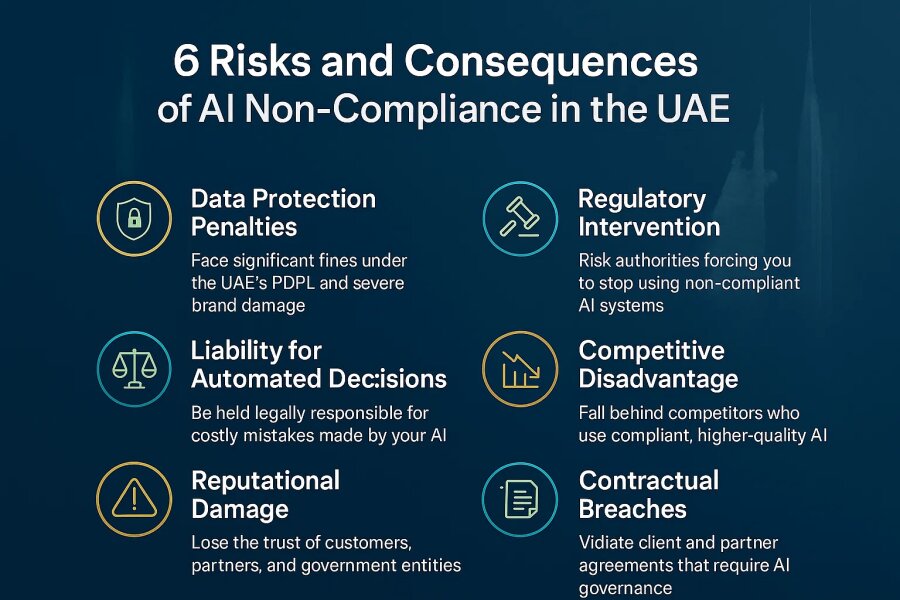Artificial Intelligence (AI) is transforming the legal and commercial landscape across the UAE, but rapid adoption also brings new responsibilities. With the nation’s strong commitment to innovation and digital transformation, reflected in initiatives like the UAE National Strategy for Artificial Intelligence 2031, regulators are also introducing more robust rules for AI governance and data protection.
Businesses must ensure that their AI tools and data management practices comply with UAE technology law and emerging AI governance standards. The UAE’s Federal Decree-Law No. 45 of 2021 on the Protection of Personal Data (PDPL) establishes clear obligations around personal data use, while ongoing efforts by the Ministry of Artificial Intelligence and Digital Economy aim to align AI in legal UAE practices with global best standards.
Failing to address data privacy laws in the UAE and AI compliance requirements exposes organizations to a range of operational, legal, and reputational risks. Below are six major consequences of non-compliance that every business should understand.

- Data protection penalties: this represents the most concrete risk. The PDPL authorizes fines for violations, though enforcement practices are still developing. Businesses that mishandle personal data through AI systems face potential financial penalties. More significantly, data protection violations often require notification to affected individuals and regulators, creating reputational damage that may exceed direct financial costs. For businesses serving privacy-conscious customers or operating in sectors like financial services where trust is paramount, data protection failures can prove commercially devastating.
- Regulatory intervention: these may take forms beyond financial penalties. Authorities could require you to cease using non-compliant AI systems, potentially disrupting business operations. They might impose enhanced oversight or reporting requirements. In extreme cases, regulatory action could affect your broader business licensing. Free zone authorities exercise significant discretion over businesses operating within their jurisdictions, and compliance failures could jeopardize your ability to maintain that presence.
- Liability for automated decisions: this creates legal exposure when AI systems make consequential mistakes. If your AI wrongly denies someone credit, incorrectly screens out qualified job applicants, or generates defamatory content, you face potential civil liability. The fact that an algorithm made the error doesn't shield you from responsibility. UAE law generally holds businesses accountable for their operations, including automated ones. The nascent nature of AI-specific case law means uncertainty about how courts will apportion liability, but that uncertainty itself represents risk.
- Reputational damage: this often exceeds direct legal consequences. News that your AI system demonstrates bias, violates privacy, or makes significant errors spreads rapidly. In the UAE's interconnected business community, reputation matters enormously. Customers, partners, and even government entities may hesitate to work with businesses known for irresponsible AI use. For companies dependent on government contracts or relationships, compliance failures could prove particularly costly.
- Competitive disadvantage: this emerges in multiple ways. Businesses ignoring AI governance may face restrictions that compliant competitors avoid. More subtly, poor AI governance often correlates with poor AI performance. Systems developed without attention to bias, transparency, and human oversight tend to be lower quality. Meanwhile, competitors investing in responsible AI practices develop better systems while simultaneously reducing their risk exposure.
- Contractual breaches: these may occur if your AI practices violate agreements with customers, partners, or vendors. Many sophisticated counterparties now include AI governance requirements in their contracts. Failures could trigger breach claims, termination rights, or indemnification obligations.
As the UAE strengthens its position as a global leader in innovation, compliance with AI and data governance frameworks is no longer optional. Companies must align their practices with both the PDPL and future-focused initiatives such as the UAE Council for Artificial Intelligence and Blockchain. Understanding the intersection of AI laws in the UAE, data privacy laws, and AI governance in the UAE is essential for maintaining credibility and trust.
Businesses operating in sectors like finance, technology, and e-commerce should also stay informed about developments within UAE free zones and ensure their operations meet emerging compliance expectations.
To explore expert legal guidance and representation on these issues, visit Lawzana’s UAE eCommerce and Internet Lawyers directory.





